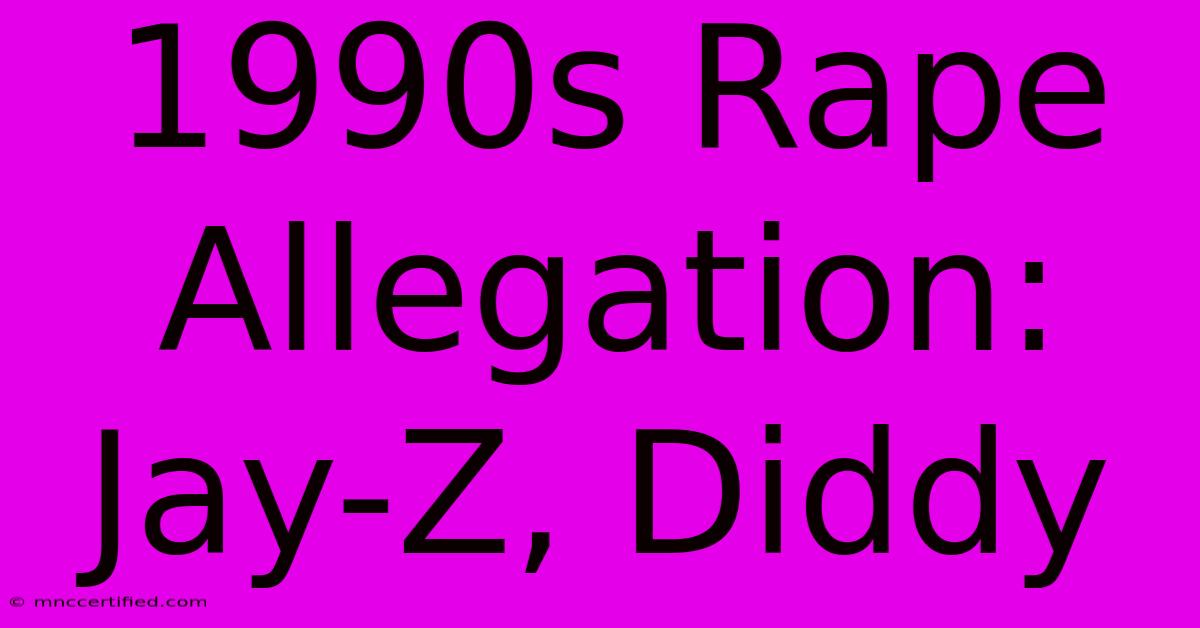1990s Rape Allegation: Jay-Z, Diddy

Table of Contents
The 1990s Rape Allegations Shadowing Jay-Z and Diddy: A Complex and Unresolved Issue
The legacies of Jay-Z and Diddy, two titans of the hip-hop industry, are undeniably intertwined with immense success and cultural influence. However, a dark cloud hangs over their past: separate, unsubstantiated allegations of rape from the 1990s that continue to fuel debate and scrutiny. These allegations, though never resulting in criminal charges, remain a significant part of the narrative surrounding these influential figures. Understanding the context, the lack of definitive resolutions, and the ongoing impact is crucial for a nuanced perspective.
The Allegations: A Lack of Public Information and Legal Resolution
The details surrounding the specific allegations against Jay-Z and Diddy remain scarce in publicly accessible information. This lack of transparency fuels speculation and hinders a complete understanding of the events. Crucially, no criminal charges were ever filed in either case, highlighting the complexities and inherent challenges in prosecuting such cases, particularly those occurring decades ago. The absence of legal proceedings doesn't equate to a declaration of innocence or guilt, but rather underscores the inherent difficulties in proving such allegations beyond a reasonable doubt.
It's important to note that rumors and unsubstantiated claims circulating online should be treated with extreme caution. Focusing solely on these without acknowledging the absence of concrete evidence is irresponsible and potentially harmful. Reliable information is critical in navigating this sensitive topic.
The Impact on Public Perception and Legacy
Despite the absence of convictions, the allegations have undoubtedly impacted the public perception of both Jay-Z and Diddy. The #MeToo movement has brought renewed focus on historical allegations of sexual assault, prompting a re-evaluation of the actions and behavior of prominent figures. For many, these allegations raise questions about accountability and the responsibility of powerful individuals to uphold ethical standards.
However, it's equally important to avoid the pitfalls of trial by media. The lack of proven evidence necessitates a careful and considered approach, acknowledging the complexities of these situations without prematurely passing judgment.
Navigating the Ethical Considerations
The discussion surrounding these allegations necessitates a nuanced approach. We must balance the need for accountability with the presumption of innocence until proven guilty. It's essential to:
- Respect the potential victims' privacy: Protecting the identities and experiences of those who have come forward with accusations is paramount.
- Acknowledge the challenges of prosecuting historical sexual assault cases: The passage of time significantly impacts evidence gathering and witness recollections.
- Promote open dialogue and critical thinking: Encouraging informed conversations about sexual assault and accountability is crucial for creating a safer and more equitable society.
- Avoid spreading misinformation: Relying on verified sources and avoiding sensationalism is vital in responsibly addressing this sensitive issue.
Conclusion: A Call for Informed Discussion and Responsible Reporting
The 1990s rape allegations against Jay-Z and Diddy remain a complex and sensitive issue. While no criminal charges were filed, the allegations continue to shape public perception and raise important questions about accountability and the challenges of prosecuting historical sexual assault cases. Moving forward, responsible reporting and open dialogue that prioritize respect for all parties involved are crucial for a balanced understanding of this enduring controversy. It's imperative to avoid perpetuating unsubstantiated claims and to focus on fostering a culture of accountability while upholding the principles of justice. Further research and responsible reporting can help shed more light on this sensitive topic and contribute to a more informed public discourse.

Thank you for visiting our website wich cover about 1990s Rape Allegation: Jay-Z, Diddy. We hope the information provided has been useful to you. Feel free to contact us if you have any questions or need further assistance. See you next time and dont miss to bookmark.
Featured Posts
-
Police Identify Strong Person Of Interest
Dec 10, 2024
-
Champions League Predictions October 12th
Dec 10, 2024
-
Andy Eth Price Prediction
Dec 10, 2024
-
2025 Golden Globe Nominations See The Full List
Dec 10, 2024
-
Habba New Attorney For Trump
Dec 10, 2024